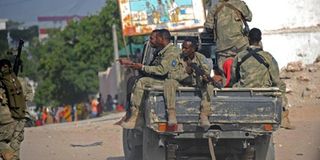Reveal the human cost of Kenya’s war in Somalia

Somali soldiers patrol an area where Al-Shabaab terrorists carried out a suicide attack against a military intelligence base in Mogadishu on June 21, 2015. PHOTO | MOHAMED ABDIWAHAB |
What you need to know:
- Records could help inform debate on whether KDF should withdraw from the Horn of Africa country or not.
I was recently reminded of how little we know about Kenya’s invasion of Somalia, and about the military’s subsequent involvement in the African Union peacekeeping mission.
This includes the human cost of the war for the people in southern Somalia, and of the number of Kenyan soldiers who have been killed or injured. Analysts estimate that the latter runs into the hundreds, but there is no publicly available data to verify or further specify such claims.
The numbers are important. First, because people and their lives matter, and loss deserves acknowledgment.
Second, because such data could help inform debate on whether Kenya should withdraw from Somalia or not. To date, this discussion has focused on what Dave Anderson and Jacob McKnight have called the “blowback” from Kenya’s invasion of its northern neighbour, namely, the fact that Al-Shabaab responded with an escalation of attacks on Kenyan soil.
Indeed, Anderson and McKnight estimate that there were at least 80 such attacks between October 2011 and June 2014, and there have been many more thereafter.
Moreover, while the four Al-Shabaab terrorists killed during the Westgate attack seem to have been ethnic Somali (one from Norway and the rest from Somalia), a broader mix of people (non-Kenyan and Kenyan, Somalis and non-Somalis) are reported to have participated in more recent attacks. This shift reflects an evolving strategy whereby Al-Shabaab has become increasingly adept at drawing upon the frustrations of some Muslims in north-eastern Kenya, the Coast and Nairobi.
Given this reality, it is understandable that much of the debate has been on the costs the war has had on Kenyans within Kenya.
However, for an informed discussion, we need to consider the full range of costs: not only financial but also the lives of Kenyan security officers, their families and loved ones, and that of the residents of northern Kenya and southern Somalia.
Since, at one level, these numbers should be part of any evaluation of success. While, at another, they might have indirect security effects. For example, survivors of the Westgate raid quoted their attackers as saying: “You are killing our people in Somalia, now it is your turn.”
HUMAN COSTS
This begs a series of important questions: Have abuses taken place? If so, how bad have they been? And, as Ben Rawlence has argued, are they being dealt with “in a way that does not undermine the military and political objective” by creating grievances and helping Al-Shabaab to mobilise local recruits?
Numbers could also help inform a related discussion about current and possible State and non-State responses to the human costs of the war. For example, how are returning soldiers coping, especially when they have suffered injuries? And how are the families supported in their grief and loss in the case of fatalities?
Kenyan military personnel in Somalia fall under the African Union Mission in Somalia. As a result, soldiers are insured and, in the case of their injury or death, they or their families should receive compensation. But have payments always been made? Has the money been received? How else could the families be supported? Such questions are impossible to answer when we do not know the scale of the problem.
In addition, it has been reported that some Administrative Police and regular officers have been killed by Al-Shabaab. Do their families receive any compensation? If so, how much, and what other support do people feel should be provided to them? If not, should they be? Again, it is difficult to have a public discussion of these issues and for appropriate programmes to be put in place if people do not know the numbers and the scale of the issue.
Numbers are clearly sensitive and any figures for Somalis killed or injured in Somalia will be contested. However, there must be records of how many Kenyan soldiers have been killed. And I do not think that this data should be withheld — as other information, for example, on intelligence and planned operations should be — in the interests of security.
On the contrary, I feel that such information would help recognise people’s loss, but also strengthen discussions about what security is being provided, at what costs and with what short and long-term implications.
The writer is an associate professor of Comparative Politics, University of Warwick, UK. [email protected]. @GabrielleLynch6





